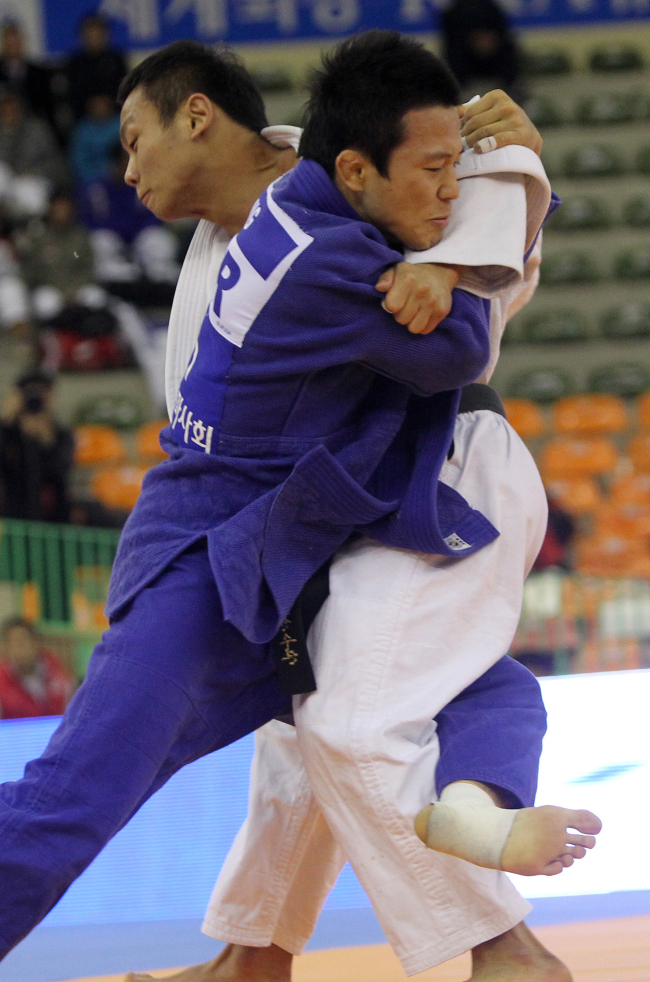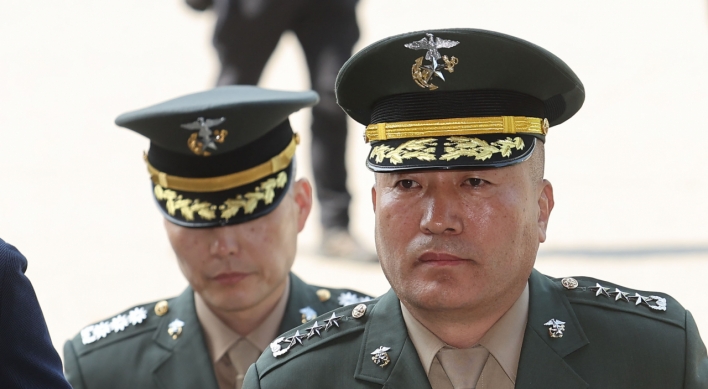Wang Ki-chun, Nakaya Riki look to put it all on the line
By Korea HeraldPublished : July 24, 2012 - 19:43
The following is the sixth of a series of articles on rival athletes in South Korea’s most competitive events at the London 2012 Olympic Games. -Ed.
For South Korea’s ace judoka Wang Ki-chun, an Olympic silver medal arouses bitter memories.
The scene was the Beijing Science and Technology University Gymnasium on Aug. 11, 2008.
There, he lost the gold medal to Elnur Mammadli of Azerbaijan just 13 seconds into the men’s 68kg class match.
Mammadli grabbed Wang’s right knee, tripping and rolling him on the mat. The referee instantly declared ippon, judo’s equivalent of a knockout, ending the match. It all happened in a flash.
Dumbfounded, Wang seemed to forget to how to stand up, staying put with one of his knees on the mat for some time.
He left the mat in frustration at his poor showing in the long-awaited final.
On the way to the gold medal match of his Olympic debut at age 20, he had bad luck. In the quarterfinal, Leandro Guilheiro of Brazil elbowed his left side so hard that it fractured one of his ribs.
For South Korea’s ace judoka Wang Ki-chun, an Olympic silver medal arouses bitter memories.
The scene was the Beijing Science and Technology University Gymnasium on Aug. 11, 2008.
There, he lost the gold medal to Elnur Mammadli of Azerbaijan just 13 seconds into the men’s 68kg class match.
Mammadli grabbed Wang’s right knee, tripping and rolling him on the mat. The referee instantly declared ippon, judo’s equivalent of a knockout, ending the match. It all happened in a flash.
Dumbfounded, Wang seemed to forget to how to stand up, staying put with one of his knees on the mat for some time.
He left the mat in frustration at his poor showing in the long-awaited final.
On the way to the gold medal match of his Olympic debut at age 20, he had bad luck. In the quarterfinal, Leandro Guilheiro of Brazil elbowed his left side so hard that it fractured one of his ribs.

He endured severe pain from the injury, advancing to the semifinal and then to the final. He reminded himself of his life motto: “I would rather die than lose a fight.”
To his regret, however, he lost the final without flexing his muscles at all, and had to fold his gold-medal dream.
In the four years since, Wang has sweated buckets practicing with an eye on an Olympic gold, and finally got on an airplane for London, Monday, as the No. 1 ranked 73kg-class judoka in the world.
After the Beijing Olympics, he wasted no time in concentrating on training for gold in London.
He swept five major tournaments last year: the IJF World Masters in Baku, Asian Championships, Abu Dhabi Grand Prix, Korea World Cup and Qingdao Grand Prix.
The Korea Judo Association selected him as the Most Valuable Player of 2011.
Wang also won the gold in the IJF Masters in Almaty in January this year. He stepped up his training, and got to the top in the Asian Championships in April, and finally went on to become the world No. 1.
Standing in his way to a gold medal in London is the second-ranked Nakaya Riki, a strong favorite from Japan, the heartland of the sport.
The 23-year-old was the reigning champ until just before the Asian Championships in April this year. He captured the 2011 world championship title in August, last year, moving into the spotlight as an Olympic favorite.
Nakaya, who began to make a name on the international stage in 2007, showed his best form last year, winning 29 matches and losing just three in a year.
While Wang’s specialty is his throw, the Japanese judoka has an excellent choke as well as throw.
Nakaya started judo as a kindergartner and cut a conspicuous figure as he won a silver medal in a local tournament for middle school judokas from across the nation. He also impressed the global judo community by becoming a junior champ in 2007.
Nakaya reached the summit of the Tokyo Grand Slam in 2010, and swept two Grand Slams last year in Paris and Rio de Janeiro.
Wang and Nakaya have fought each other twice so far. The Korean judoka won both times. Wang defeated Nakaya with ippon in their first showdown, which was the final of the 2011 Asian Championships in April, 2011. In their second encounter, also the final round in the IJF Masters in January this year, Wang edged past Nakaya in a 2-1 decision.
By Chun Sung-woo (swchun@heraldcorp.com)
-
Articles by Korea Herald



















